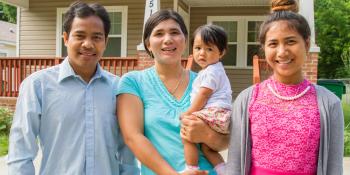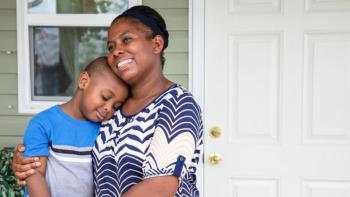
The impact of housing affordability on families
An affordable, quality home is critical to a family’s well-being — physically, mentally, economically, developmentally.
As home prices — for rental and ownership — continue to outpace wage growth in the United States, families often find themselves struggling in other major areas of their lives as basic needs are pitted against each other. Nutrition, education, transportation, child care, health care.
A single mother, for example, earning minimum wage who spends most of her pretax income on housing has only $124 per week — or $17 a day — left to spend on all other necessities. A cost-burdened renter had less than $10 in savings in 2015.
Households that find themselves in these situations simply aren’t able to put money aside and will have trouble bouncing back from unexpected life events such as losing a job, caring for a sick family member or recovering from a car accident.
However, bringing housing costs to an affordable level can make all the difference in the life — and future — of a family.
“There are broad, long-term effects to affordable housing. People who are affordably housed earn more over their lifetime, they live longer, their children do better in school.”— Sarah Saadian, senior vice president of public policy and field organizing at the National Low Income Housing Coalition
Economic opportunity: Ending the cycle
“Addressing housing affordability is the most cost-effective way of lifting people out of poverty, for reducing childhood poverty and increasing economic mobility,” says Sarah Saadian, senior vice president of public policy and field organizing at the National Low Income Housing Coalition.
Because housing is the top monthly expense for most families, Saadian says, “tackling affordability can result in drastic changes.” When home is affordable and there is more money left over for things like transportation and child care, it can open up an array of education and employment opportunities.
“There are broad, long-term effects to affordable housing,” says Saadian. “People who are affordably housed earn more over their lifetime, they live longer, their children do better in school.”
These outcomes not only reduce existing poverty, she says, but can help end the cycle of intergenerational poverty that unstable and unaffordable housing can perpetuate.
Health: Determined by zip code
“If your housing is unaffordable, you then struggle with having to make tradeoffs. We know the stress of those tradeoffs is toxic for parents. It is toxic for kids,” says Dr. Megan Sandel, associate professor of pediatrics and of environmental health at Boston University.
This stress can manifest itself in both mental and physical health concerns, she says. “Having to make those tradeoffs or worry about making next month’s rent can have huge implications in terms of high blood pressure, diabetes, heart disease, depression and other mental health illness.”
When a formerly cost-burdened family no longer has to cover oppressive monthly housing costs, they can afford more preventative care and spend less on expensive emergency care. What’s more, leaving behind the stress of unaffordable rent or poor living conditions can lead to improved health for families.
Stability: Child development and education
Low-quality housing can be consistently linked to emotional and behavioral issues in children, research shows. Additionally, kids whose families move frequently perform worse on tests and generally have lower academic achievement.
“The data show that housing stability is such an important driver for children’s growth and educational outcomes,” says Jonathan Reckford, CEO of Habitat for Humanity International. “There’s also a huge psychological aspect to having decent housing. Children can invite their friends over. They are no longer ashamed of where they live.”
“Having to make those tradeoffs or worry about making next month’s rent can have huge implications in terms of high blood pressure, diabetes, heart disease, depression and other mental health illness.”— Megan Sandel, associate professor of pediatrics and of environmental health at Boston University
A better future
For Valeriah, building a home with Black Hills Habitat for Humanity was the first step in knocking down the roadblocks that unstable and affordable housing can create.
When she and her family first moved to Rapid City, South Dakota, they were homeless for four months, crashing on couches. She worked for the state but still could not meet the minimum salary requirements for most apartments, a problem compounded by the racial bias she experienced as a member of the Yankon Sioux Tribe. “That was a huge stressor, not being able to have a safe place that we knew was ours,” she says.
Having an affordable place to live has allowed her to pursue her Ph.D., to take a meaningful job as a university advisor that offers higher pay and to begin the process of dismantling the cycle of poverty she was raised in. “I could put money toward my student loans or toward more food for my family or even having that $250 in my savings account if anything went wrong,” she says.
The difference is palpable. “I can just feel it already,” she says. “This home is setting our kids up for a better future than I had.”
To Valeriah, advocacy is the answer for helping more families like hers have affordable places to call home. “Advocacy is being a voice, empowering other people to exert their voice and tell their story,” she says. “We’re trying to help everyday people prosper in this economy through safe, affordable housing. Telling our stories makes the issue real.”

